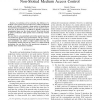Free Online Productivity Tools
i2Speak
i2Symbol
i2OCR
iTex2Img
iWeb2Print
iWeb2Shot
i2Type
iPdf2Split
iPdf2Merge
i2Bopomofo
i2Arabic
i2Style
i2Image
i2PDF
iLatex2Rtf
Sci2ools
138
Voted
INFOCOM
2006
IEEE
2006
IEEE
A Packing Approach to Compare Slotted and Non-Slotted Medium Access Control
— In multi-hop ad hoc networks, the efficiency of a medium access control protocol under heavy traffic load depends mainly on its ability to schedule a large number of simultaneous non-interfering transmissions. However, as each node has only a local view of the network, it is difficult to globally synchronize transmission times over the whole network. How does the lack of global coordination affect spatial reuse in multi-hop wireless networks? We show that in a de-centralized network the spatial reuse does not benefit from global clock synchronization. On the contrary, we demonstrate that non-slotted protocols using collision avoidance mechanisms can achieve a higher spatial reuse than the corresponding slotted protocols. By means of a simple backoff mechanism, one can thus favor the spontaneous emergence of spatially dense transmission schedules.
| Added | 11 Jun 2010 |
| Updated | 11 Jun 2010 |
| Type | Conference |
| Year | 2006 |
| Where | INFOCOM |
| Authors | Mathilde Durvy, Patrick Thiran |
Comments (0)

